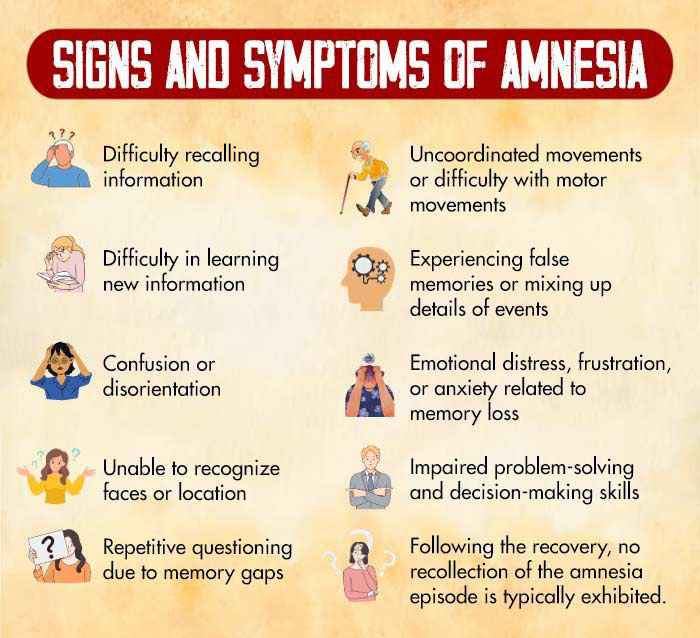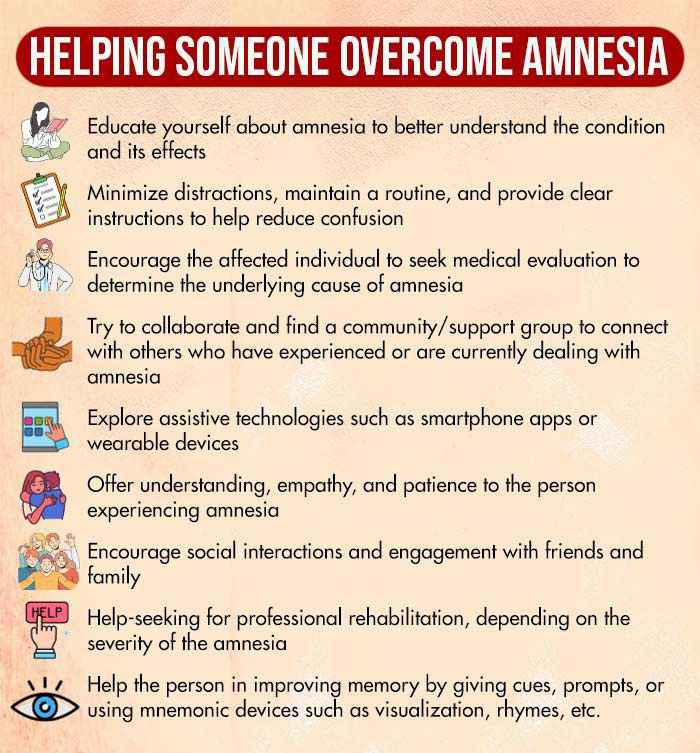Amnesia is characterized by memory impairment, which hampers the ability to learn, remember new information, and recall past events. It can lead to repetitive behaviors, confusion, emotional distress, and profound disruptions in daily functioning and future planning.
What is Amnesia?
Amnesia is a complex neurological condition 1 Squire, L. R., & Zola, S. M. (1997). Amnesia, memory and brain systems. Philosophical transactions of the Royal Society of London. Series B, Biological sciences, 352(1362), 1663–1673. https://doi.org/10.1098/rstb.1997.0148 leading to significant memory loss, affecting both short-term and long-term memory. The term “amnesia” originates from the Greek language 2 Allen R. J. (2018). Classic and recent advances in understanding amnesia. F1000Research, 7, 331. https://doi.org/10.12688/f1000research.13737.1 , meaning “forgetfulness.”
However, it is important to note that the symptoms of amnesia are far more profound and severe than everyday forgetfulness. This condition presents challenges in retaining new information and recalling past experiences, with the severity and manifestation varying based on the underlying cause and individual circumstances.
While both men and women 3 MacDonald, S., Uesiliana, K., & Hayne, H. (2000). Cross-cultural and gender differences in childhood amnesia. Memory (Hove, England), 8(6), 365–376. https://doi.org/10.1080/09658210050156822 can be affected by amnesia, there may be a higher likelihood of memory loss in men. It is worth mentioning that around 40% 4 Nehring, S. M., Spurling, B. C., & Kumar, A. (2023). Transient Global Amnesia. PubMed; StatPearls Publishing. Available from: https://www.ncbi.nlm.nih.gov/books/NBK442001/#:~:text=The%20incidence%20of%20TGA%20is of individuals over the age of sixty experience some degree of memory loss, highlighting the prevalence of this condition among older adults.

Types of Amnesia
The most common 5 Allen, R. J. (2018). Classic and recent advances in understanding amnesia. F1000Research, 7(1), 331. https://doi.org/10.12688/f1000research.13737.1 types of amnesia include:
1. Anterograde Amnesia
Individuals with anterograde amnesia are unable to retain new information. However, their memories prior to the injury remain intact.
2. Retrograde Amnesia
Retrograde amnesia involves the inability to recall events that occurred before the traumatic incident. However, the person can remember events that took place after the incident.
Read More About Retrograde Amnesia Here
3. Transient Global Amnesia
This condition manifests as a temporary loss of all memory, and in severe cases, individuals may experience difficulty in forming new memories. It is quite rare and more commonly observed in older adults with vascular (blood vessel) diseases.
4. Infantile Amnesia
It refers to the phenomenon where individuals are unable to recall memories of events from early childhood. It is common for people to have few or no memories before the ages of three to five due to the ongoing development of the brain areas responsible for memory formation.
Read More About Memory Here
5. Traumatic Amnesia
It refers to memory loss resulting from severe events, such as a car accident. The person may experience a brief loss of consciousness or even suffer from a coma. While this type of amnesia is usually temporary, its duration often depends on the severity of the injury.
6. Fugue or Dissociative Amnesia
On rare occasions, individuals may forget both their past and their identity. They may wake up with a sudden lack of self-awareness. This condition is usually triggered by a traumatic event. While the ability to remember information typically returns within minutes, hours, or days, the memory of the triggering event may never fully recover.
7. Alcohol-induced Amnesia
Commonly known as a blackout, this condition occurs when excessive alcohol consumption leads to memory gaps.
What Causes Amnesia?
The symptoms of amnesia can be caused by 6 Squire, L. R., & Zola, S. M. (1997). Amnesia, memory and brain systems. Philosophical transactions of the Royal Society of London. Series B, Biological sciences, 352(1362), 1663–1673. https://doi.org/10.1098/rstb.1997.0148 various factors, including:
- Severe head injuries, concussions, or damage to the brain due to accidents, falls, or physical assaults can result in amnesia.
- Stroke, which leads to disruption of blood flow to the brain, leading to brain damage can cause amnesia.
- Neurodegenerative diseases, such as 7 Lamptey, R. N. L., Chaulagain, B., Trivedi, R., Gothwal, A., Layek, B., & Singh, J. (2022). A Review of the Common Neurodegenerative Disorders: Current Therapeutic Approaches and the Potential Role of Nanotherapeutics. International journal of molecular sciences, 23(3), 1851. https://doi.org/10.3390/ijms23031851 Alzheimer’s disease, Parkinson’s disease, and other forms of dementia can lead to amnesia.
- Certain medical conditions such as epilepsy, tumors, infections (like encephalitis), and oxygen deprivation to the brain can cause amnesia.
- Excessive and prolonged use of alcohol or drugs can lead to alcohol-induced or drug-induced amnesia, often referred to 8 Wetherill, R. R., & Fromme, K. (2016). Alcohol-Induced Blackouts: A Review of Recent Clinical Research with Practical Implications and Recommendations for Future Studies. Alcoholism, clinical and experimental research, 40(5), 922–935. https://doi.org/10.1111/acer.13051 as blackouts.
- Severe emotional trauma and stress can result in amnesia as a defense mechanism to block out distressing memories.
- Conditions such as high blood pressure or high cholesterol, which are associated with cardiovascular disease, can contribute to the development of amnesia.
Read More About Stress Here
How to Diagnose Amnesia?
Diagnosing amnesia typically involves 9 Lips, W., Mascayano, F., & Lanfranco, R. (2014). Diagnostic indicators of dissociative amnesia: a case report. Psychiatria Danubina, 26(1), 70–73. a comprehensive evaluation by a healthcare professional, such as a neurologist or neuropsychologist. The diagnostic process may include the following:
- A detailed medical history, including information about the individual’s symptoms, past medical conditions, medications, and any recent traumatic events or illnesses.
- A physical examination may be conducted to assess overall health and identify any signs of neurological abnormalities that could be contributing to amnesia.
- Various psychological tests such as 10 Levin, H. S., O’Donnell, V. M., & Grossman, R. G. (1979). The Galveston Orientation and Amnesia Test. A practical scale to assess cognition after head injury. The Journal of nervous and mental disease, 167(11), 675–684. https://doi.org/10.1097/00005053-197911000-00004 the Galveston orientation & amnesia test may be employed to evaluate cognitive function, memory, and other mental processes.
- Imaging techniques like 11 Hussain, S., Mubeen, I., Ullah, N., Shah, S. S. U. D., Khan, B. A., Zahoor, M., Ullah, R., Khan, F. A., & Sultan, M. A. (2022). Modern Diagnostic Imaging Technique Applications and Risk Factors in the Medical Field: A Review. BioMed research international, 2022, 5164970. https://doi.org/10.1155/2022/5164970 magnetic resonance imaging (MRI) or computed tomography (CT) scans may be used to visualize brain abnormalities.
- Blood tests or other laboratory investigations to check for underlying medical conditions, such as infections, vitamin deficiencies, or hormonal imbalances.
Treatment for Amnesia
The treatment for amnesia depends on the underlying cause and specific needs of the individual. Here are some general treatment 12 Allen R. J. (2018). Classic and recent advances in understanding amnesia. F1000Research, 7, 331. https://doi.org/10.12688/f1000research.13737.1 approaches that may be used:
1. Occupational Therapy
Occupational therapists can provide memory training techniques such as visualization techniques, and organizational strategies to help individuals compensate for memory deficits. For example, if someone needs to remember a grocery list, the therapist may suggest visualizing each item in a vivid and memorable way.
2. Psychotherapy
Psychotherapy like cognitive-behavioral therapy 13 Chand, S. P., Kuckel, D. P., & Huecker, M. R. (2022, September 9). Cognitive Behavior Therapy (CBT). National Library of Medicine; StatPearls Publishing. Available from: https://www.ncbi.nlm.nih.gov/books/NBK470241/ (CBT), can be beneficial in addressing the emotional and psychological impact of amnesia. Therapy can help individuals cope with memory loss, manage stress, and develop strategies for living with amnesia.
Read More About Psychotherapy Here
3. Medications
Medications (such as donepezil) can play 14 Rossato, J. I., Bonini, J. S., Coitinho, A. S., Vianna, M. R. M., Medina, J. H., Cammarota, M., & Izquierdo, I. (2004). Retrograde amnesia induced by drugs acting on different molecular systems. Behavioral Neuroscience, 118(3), 563–568. https://doi.org/10.1037/0735-7044.118.3.563 a crucial role in treating the underlying conditions that contribute to amnesia, such as brain infections, cardiac problems, anoxia, and thiamine deficiency.
How to Reduce the Risk of Amnesia?
Here are some ways 15 Ortega-de San Luis, C., & Ryan, T. J. (2018). United states of amnesia: rescuing memory loss from diverse conditions. Disease models & mechanisms, 11(5), dmm035055. https://doi.org/10.1242/dmm.035055 to lower the risk of amnesia:
- Engage in regular physical exercises.
- Follow a balanced diet rich in fruits, vegetables, whole grains, lean proteins, and healthy fats.
- Wear appropriate protective headgear during activities with a risk of head injury.
- Practice stress management techniques, such as yoga or meditation, or breathing techniques.
- Engage in mentally stimulating activities such as crossword puzzles to make the brain active.
- Maintain social connections and stay socially active.
- Get sufficient and regular sleep each night.
- Manage diabetes by following healthcare professionals’ recommendations for diet, exercise, and medication.
- Avoid heavy use of alcohol or drugs, as excessive alcohol or drug use can lead to brain damage.
- Seek treatment and support if experiencing symptoms of mental health conditions such as depression or anxiety, which can affect cognitive functions.

Takeaway
Amnesia is a condition characterized by memory loss, which can be caused by various factors such as head injuries, trauma, neurological disorders, and certain medications. Understanding the different types and causes of amnesia is crucial for early detection, proper diagnosis, and targeted treatment strategies for living with amnesia.
At a Glance
- Amnesia is a complex neurological condition leading to significant memory loss, affecting both short-term and long-term memory.
- Different types of amnesia are retrograde, anterograde, dissociative, fugue, traumatic, infantile, and transient global amnesia.
- Head injuries, trauma, neurological disorders, certain medications, and psychological factors can lead to amnesia.
- Diagnoses techniques such as medical history, neurological examinations, cognitive tests, and brain imaging (MRI, CT scans) are evaluated for symptoms of amnesia.
- Treatments for amnesia include cognitive therapy, occupational therapy, and medication.
- To reduce the risk of amnesia, it is important to prioritize a healthy lifestyle, engage in regular exercise, and protect the head from injury.
Frequently Asked Questions (FAQs)
1. Can mental trauma cause amnesia?
Mental trauma can cause a type of amnesia known as dissociative amnesia, which is typically triggered by severe psychological trauma, such as experiencing a traumatic event, witnessing violence, or enduring emotional abuse.
2. Can stress cause amnesia?
Stress can contribute to temporary memory impairments or difficulties with memory retrieval.
3. How amnesia affects your life?
Individuals with amnesia commonly experience challenges with short-term memory, leading to difficulties in retaining and recalling new information.
4. How does amnesia affect behavior?
Amnesia may lead to repetitive questioning, confusion, and a reliance on external memory aids while causing emotional distress and impairing future planning abilities.















